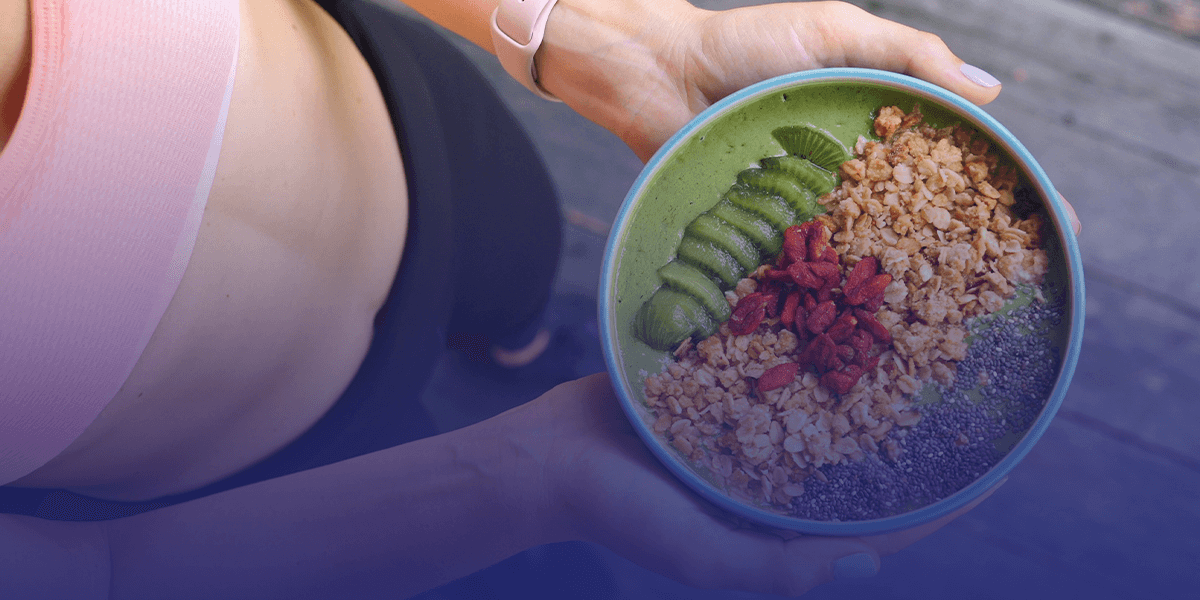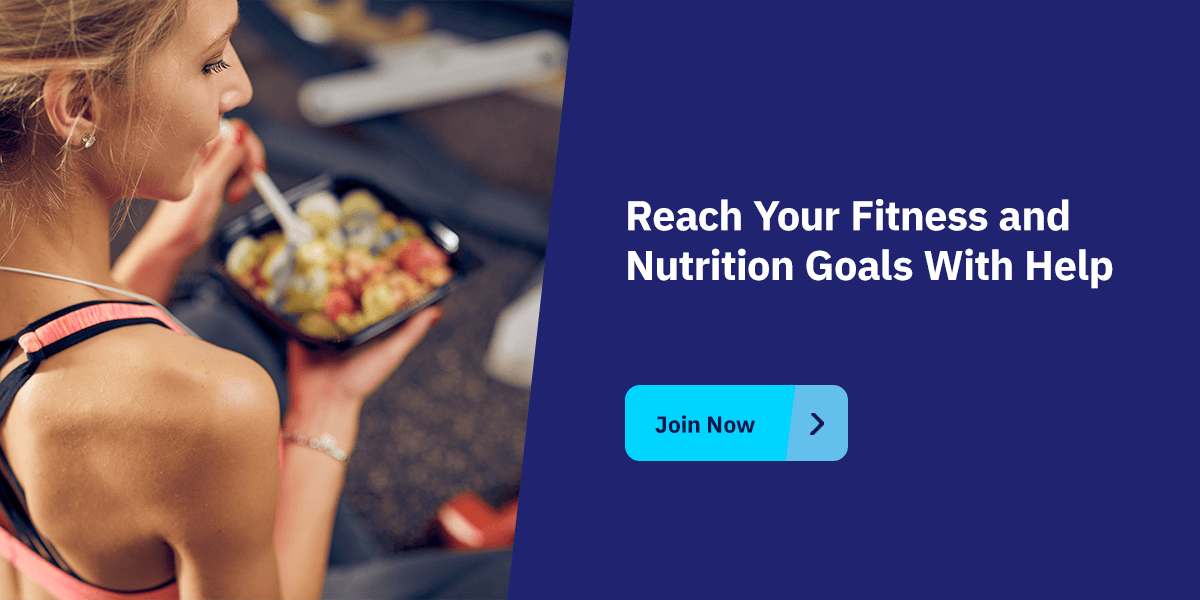Fitness Nutrition 101: A Beginner's Guide to Personalized Nutrition
Fitness Nutrition 101: A Beginner’s Guide to Personalized Nutrition
Posted on: April 18, 2023 in Nutrition
Starting your fitness journey can be overwhelming at first. With so much conflicting information on eating well or the best fitness nutrition plan, it is easy to get swayed into the latest nutrition or fitness trends.
The best way to create a fitness and nutrition plan is to focus on your body and personal health goals. Your goals determine the types and amount of nutrients and physical fitness you require. Eat, workout and build your own fitness and nutrition path.
Why Is Nutrition Key in Fitness?
Nutrition is essential in helping you achieve your personal fitness goals, and good nutrition starts with your eating habits. Changing your habits and creating a balanced and healthy relationship with food can help you reach your fitness goals. Incorporating balanced nutrients into all your meals can increase your energy levels and help you look and feel your best.
Every fitness goal is different and requires a unique nutrition plan. Your nutrition plan must align with your metabolism, eating times, economic circumstances and lifestyle so sticking with it is pleasurable and sustainable. A healthy fitness and nutrition plan is balanced and realistic, allowing you to make healthier food choices while still enjoying your life.
Many people find sticking to their fitness goals challenging because they follow extreme and impractical diets. Think about every time you hear someone talking about clean eating, cheat days or the best eating times. Blanket statements about certain foods and what eating well means can lead to many misconceptions about nutrition’s role in your fitness journey.
Negative language about nutrition and fitness can lead to strict eating habits and cause an unhealthy relationship with food. Many people develop eating disorders like anorexia, bulimia, binge eating or orthorexia because of extreme beliefs about nutrition.
In contrast, a healthier relationship with food can make your fitness path more enjoyable. A healthy and balanced nutrition plan tailored for you can keep you excited about your fitness journey and help you stay motivated. Fitness nutrition begins when you understand each food source and how to incorporate them into your lifestyle.

Macronutrients: The Basic Elements of Nutrition
Macronutrients are the main components of food — proteins, carbohydrates and fats. You need macronutrients in larger quantities than micronutrients like vitamins and minerals. However, everyone’s nutrition plan requires varying amounts of macro- and micronutrients to help them achieve their fitness goals.
For example, a bodybuilder may prioritize high amounts of protein, healthy fats and complex carbs as part of their nutrition plan to build more lean muscle. In comparison, marathon runners may include more complex carbohydrates, lower fats and an average amount of protein into their nutrition plan to provide them with the energy to run long distances. Start creating your nutrition plan by defining your fitness goals so you can include the right amount of proteins, carbohydrates and fats.
Proteins
Proteins contain amino acids that repair body tissue and contribute to a healthy metabolism and immune system. Most foods contain some protein. Incorporating nutrient-dense proteins like poultry, lean meats, eggs, legumes, nuts and beans into your daily meals can help you feel satisfied and stay fuller for longer. Protein in the correct amounts for your body and fitness goals can speed up your metabolism and build muscle.
Proteins aid in muscle recovery after working out and help build lean muscle mass. A healthy nutrition plan incorporates a source of protein in every meal. Your fitness goals determine how much protein you need.
Carbohydrates
Understanding the different types of carbohydrates and how they provide energy is vital when developing an eating plan for your fitness goals. All carbohydrates, including starch, fiber and sugar, impact your blood sugar.
Your body breaks down simple carbohydrates like refined sugar, flour and glucose faster, spiking blood sugar levels. Many people include simple carbohydrates like bread, pasta and cereals in moderation as part of a healthy fitness nutrition plan. Your plan may incorporate more simple carbohydrates if you are training for a marathon and fewer if you are trying to lose weight.
Complex carbohydrates are nutrient-dense food sources that provide energy throughout your day and are essential after an intense workout. Complex carbohydrates like vegetables, oats, rice and fruit are a staple in many balanced diets as they take longer to break down in your body, resulting in a slower release of sugar into your bloodstream.
Complex carbohydrates keep you energized, help with muscle recovery and can help you burn more calories throughout the day. All carbohydrates are essential for a balanced and healthy lifestyle. You need some carbohydrates in larger quantities than others — the key is maintaining a healthy relationship with all foods.
Fats
All foods contain some fat, and some are better for you than others. Fats are part of eating well 101 and are in everything from meat, fish and baked goods to cheese, avocado and nuts. To create a balanced nutrition plan, you need to identify good fats and prioritize them.
Fats provide you with energy now and store energy for later. Your body will use energy from stored fat if you haven’t eaten enough. Fat also insulates your body and protects your organs.
You can find unsaturated fats, also called good fats, in lean meats, cheese, fish and nuts such as pecans, almonds and seeds. Most foods also contain some saturated fat. Food products like baked goods, pizza, milk chocolate and meat products like sausages and bacon have higher levels of saturated. Saturated fats contribute to higher levels of bad cholesterol, but you can still enjoy small amounts of saturated fats as part of a balanced and healthy nutrition plan.
Fats are an essential nutrient to include in your eating plan, no matter your fitness goals. A personal trainer or nutritionist can help you determine how much fat to include in your meals to reach your fitness goals.
Where to Cut Back
Cutting back on certain foods is different from restriction. Cutting back means limiting foods that are higher in saturated fat or are highly processed. These foods are often lower in nutrients and can contain artificial coloring or preservatives. A well-rounded diet limits highly processed foods like cereals, cookies, chips, ice cream and sodas as they have fewer nutrients than whole foods.
Many highly processed foods also contain fewer complex carbohydrates and proteins. Incorporating more nutrient-rich food sources into your eating plans can help you feel healthier and reach your fitness goals much easier. However, you do not have to eliminate processed foods from your diet.
Cutting back on low-nutrient foods means having a tablespoon of whole milk ice cream after a meal or a handful of chips as a snack instead of the entire bag. You make better health choices when you know how much of and when to eat highly processed food. Your fitness nutrition journey is a balancing act — eating mostly nutritious foods allows you to enjoy your favorite snack sometimes.
How to Create a Nutrition Plan
Whatever your fitness goals, a tailored nutritional plan will help you reach your goals more efficiently. Your nutrition plan should align with your health and fitness goals, age, metabolism, eating patterns and lifestyle.
Everyone requires a certain amount of calories daily to stay energized and healthy. First, determine how many calories you need daily to sustain your energy levels, stay healthy and keep fit. Many women need 1,500 to 1,800 calories per day, while many men need 2,000 calories or more to achieve their fitness goals.
You must also balance the nutrients that make up your total calories daily, meaning a healthy ratio of carbohydrates, proteins, fats, vitamins and minerals. Calculating the balance of nutrients depends on your fitness levels, how active you are in the day, your age and metabolism and the times you choose to eat during the day. For example, you might add more proteins and higher fats with fewer complex carbohydrates if you want to burn fat and build muscle. Or you might eat less protein and fat with more complex carbohydrates to lose weight and tone your muscle.
The quantities and types of carbohydrates, fats and proteins that you include in your nutrition plan affect the fitness goals you will achieve. Your fitness levels and how often you move your body will also help decide which nutrients you need to keep energized. Calculating your Body Mass Index (BMI) before creating a nutritional plan is also beneficial. BMI measures your total body fat, muscle and water mass ratio. Knowing your current fitness level and your BMI can help you create a personalized nutrition plan.
Reach Your Fitness and Nutrition Goals With Help From a Nutritionist
Every healthy lifestyle and nutrition choice can help you achieve your fitness goals. Defining your fitness goals is an excellent place to start your fitness nutrition journey, and you can do it with the help of a qualified nutritionist.
5 Bridges Health & Fitness is passionate about helping you realize your fitness goals. Our health and fitness approach focuses on nutrition, fitness, education and community. We offer gym equipment, group workouts and classes, nutrition counseling, a team of certified trainers and the space to reach your personal fitness goals.
Contact us for online nutrition coaching, and our registered dietitian will work with you to create a custom nutrition and fitness plan.



